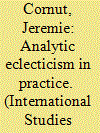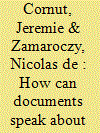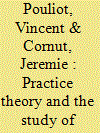| Srl | Item |
| 1 |
ID:
137606


|
|
|
|
|
| Summary/Abstract |
The relation of different theoretical approaches to one another is a disquieting question in International Relations (IR). Building on recent scholarship addressing the logic of questions and the analytical tools the scholarship provides for investigating the contributions of different explanations this piece argues that any and all explanations are an answer to a contrastive why-question. First, the article presents the objections to eclecticism. It then reviews the application of the logic of questions to IR and develops a “contrast theory” clarifying this logic: Seeking an explanation means delimiting a contrast space within a specific interrogatory context. The article lastly shows how these concepts help in thinking about post-foundational science of IR, that is, a science with no universal epistemological foundation to knowledge. I argue that the pragmatic, problem-driven and complexity-sensitive research agendas are a stronger foundation than currently predominant conceptualizations. An example, drawn from Iran's attempts to acquire nuclear weapons, helps illustrate the value-added by a logic of questions approach
|
|
|
|
|
|
|
|
|
|
|
|
|
|
|
|
| 2 |
ID:
181535


|
|
|
|
|
| Summary/Abstract |
Practice theorists favor interviews and participant observations in their study. Using insights from anthropological works on bureaucratic texts, in this article we develop methodological tools to complement these interpretive methods of data collection. We suggest a way to trace practices by systematically looking through both the content of documents and their form. We probe this approach with an analysis of 408 diplomatic cables sent by the US Embassy in Dar es Salaam, Tanzania in 2005–2009 and subsequently released by Wikileaks. We draw on these documents to tell two related stories about diplomatic practices: the first about epistemic practices and how the cables privilege certain voices and types of knowledge over others, and the second about diplomatic culture, where the cables serve as evidence of the powerful socialization processes that diplomats are subject to. This contributes to International Relations (IR) with a new approach for systematically analyzing written documents to uncover international practices.
|
|
|
|
|
|
|
|
|
|
|
|
|
|
|
|
| 3 |
ID:
141721


|
|
|
|
|
| Summary/Abstract |
This introductory article explores the multiple synergies between international practice theory and diplomatic studies. The timing for this cross-fertilizing exchange could not be better, as the study of diplomacy enters a phase of theorization while practice scholars look to confront the approach to new empirical and analytical challenges. The article first defines diplomacy as a historically and culturally contingent bundle of practices that are analytically alike in their claim to represent a given polity to the outside world. Then the key analytical wagers that practice theory makes are introduced, and debates currently raging in the discipline are briefly reviewed. Next, it is suggested what a practice theory of diplomacy may look like, discussing a variety of existing works through their common objective to explain the constitution of world politics in and through practice. Finally, a few research avenues to foster the dialogue between diplomatic studies and practice theory are outlined, centered on the nexuses of transformation and reproduction, rationality and know-how, and the technical vs. social dimensions of practices –diplomatic or otherwise.
|
|
|
|
|
|
|
|
|
|
|
|
|
|
|
|
| 4 |
ID:
106511


|
|
|